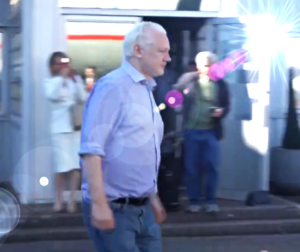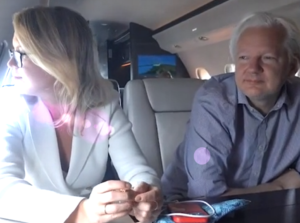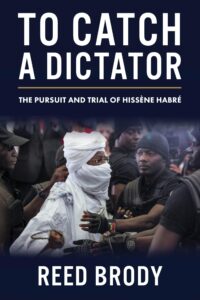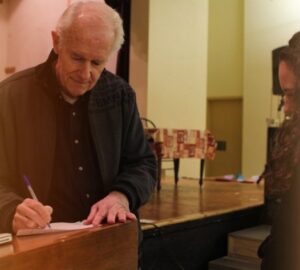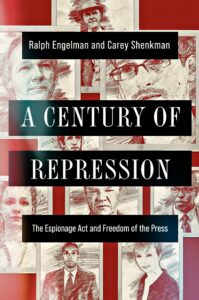Welcome to Law and Disorder Radio
Law and Disorder is a weekly independent civil liberties radio program airing on more than 150 stations and on Apple podcast. Law and Disorder provides timely legal perspectives on issues concerning civil liberties, privacy, right to dissent and practices of torture exercised by the US government and private corporations.
Law and Disorder July 1, 2024
Podcast: Play in new window | Download
Freedom For Julian Assange!
After serving 1901 days in solitary confinement in a tiny cell in the infamous Belmarsh prison in London, journalist and publisher Julian Assange is free at last.
Julian gained his freedom pursuit to a plea bargain with the government of the United States which had sought to extradite him and try him under the 1917 Espionage Act. He faced a certain conviction in a hostile Virginia court and 175 years in prison on 17 counts of conspiracy to commit espionage for receiving and publishing information damaging to the United States government.
Julian Assange was forced to plead guilty to one count of espionage in return for the time he has served in prison. Prior to that he was confined for seven years in the Ecuadorian Embassy in London, where he had sought and received political asylum.
The alleged crime he was accused of committing was the receipt and publication in 2010 of the so-called Iraq and Afghanistan war logs which document American government guilt in torture and murder including the 11 civilians and two Reuters journalists.
Julian Assange was sentenced to time served by an American federal court judge on an island in the Pacific Ocean 2000 miles from Australia. Julian Assange will now be living as a free man in Australia with his wife and two children.
Until Julian Assange Is Pardoned Press Freedom Remains At Risk – article by co-host attorney Stephen Rohde
Guest – Randy Credico, a steadfast supporter of Julian Assange. Mr. Credico. hosted the program “ Countdown to Freedom” in support of Julian for many years. He had visited him in Belmarsh prison.
—-
War Crimes, Dictators and the ICC
The International Criminal Court (ICC) along with the International Court of Justice (ICJ) were set up in 1998 in order to help prevent wars and crimes against humanity with the profound understanding that without a system of international law. a future World War III might eliminate humanity.
The United States of America, under Bill Clinton, was one of seven countries that voted against the Rome statute which set up the International Criminal Court. Clinton did eventually sign the statute but George Bush “unsigned“ it and the United States has had a testy relationship with the court. Indeed under Trump, the US imposed sanctions on the court and its prosecutor.
Last month Imran Khan, the chief prosecutor of the International Criminal Court, issued arrest warrants for Israel Prime Minister Benjamin Netanyahu and Yoav Galant, the Israeli Minister of Defense for war crimes and crimes against humanity. The ICC also issued arrest warrants for three top leaders of Hamas.
Guest – Attorney Reed Brody, was a friend, colleague, and mentee of our late cohost Michael Ratner. Reed Brody is the author of the recently published book To Catch a Dictator: The Pursuit and Trial of Hissene Habre. He has worked for many years with Human Rights Watch. Reed Brody has helped pursue the dictators Augusto Pinochet of Chile and Jean-Claude “ Baby Doc” Duvalier of Haiti. He has uncovered atrocities by US backed Contras in Nicaragua, led United Nations missions in El Salvador and the Congo, and exposed Bush administration torture.
—————————————-
Law and Disorder June 24, 2024
Podcast: Play in new window | Download
A Brief History of Kill Lists, From Langley to Lavender
Two artificial intelligence systems are being used by Israel and the United States to compile kill lists of Palestinians in Gaza. They are called Lavender and Where’s Daddy. This has led to the indiscriminate slaughter of whole families and has killed mostly women and children. The CIA and the US military have always tried to use the latest data processing technology to identify and kill their enemies. The history of American government assassinations goes back to collaborating with ex-Nazi intelligent officers after World War II.
Guest – Medea Benjamin, is co-founder of the international antiwar organization CODEPINK. She is the author of several books, including, with Nicholas J.S. Davies, War in Ukraine: Making Sense of a Senseless Conflict. She has been an advocate for social justice for more than 40 years. Described as “one of America’s most committed — and most effective — fighters for human rights” by New York Newsday, and “one of the high profile leaders of the peace movement” by the Los Angeles Times, she was one of 1,000 exemplary women from 140 countries nominated to receive the Nobel Peace Prize on behalf of the millions of women who do the essential work of peace worldwide.
—-
A Trend In Abolishing Capital Punishment
A growing number of states have abolished capital punishment in recent years. However, the death penalty remains on the books in 27 states, although the number of executions in American is at an all-time low. It is well documented that the death penalty is riddled with fatal flaws. Literally, the flaws are denying defendants a fair trial and are killing innocent people. An average of 4 wrongly convicted death-row prisoners have been exonerated each year since 1973.
According to recent research, jurors are three times more likely to recommend a death sentence for a black defendant than for a white defendant in a similar case. The death penalty does not serve as a deterrent. A study by the Death Penalty Information Center found that the South has consistently had by far the highest murder rate, yet the South accounts for more than 80% of all executions. The Northeast, which has fewer than 0.5% of all executions, has consistently had the lowest murder rate.
Guest – Mike Farrell is the President of Death Penalty Focus, an organization on whose Board I’ve served for many years. Known to millions as “B.J. Hunnicutt” on television’s historic show “M*A*S*H,” he is also a writer, director and producer. A human rights activist for over 35 years, Mike has taken part in scores of aid missions and human rights delegations to countries all over the world. Mike has visited prisons and been personally involved in numerous death penalty cases across the U.S. for over three decades.
—————————-
Law and Disorder June 17, 2024
Podcast: Play in new window | Download
Defense for Children International – Palestine v. Biden
There are defendants in a lawsuit brought in the northern district of California called Defense for Children International– Palestine v. Biden. The plaintiffs are represented by the Center for Constitutional Rights and attorney Marc Vander Hout. We’re going to talk about this lawsuit against President Biden, Secretary of State Blinken, and Secretary of Defense Austin. This lawsuit follows a January 2024 historic hearing that included testimony from some Palestinian plaintiffs and witnesses to the scale of destruction in Gaza and its impact on their families and communities.
Last week, a federal trial court in northern California found that Israel’s assault and siege of the Palestinian people in Gaza, possibly constituted genocide and implored the Biden administration to explain its “unflagging support“ for Israel. Notwithstanding these findings, the court denied the Center for Constitutional Rights‘ preliminary injunction motion and granted the government’s motion to dismiss the case on the grounds that it lacked jurisdiction over the administration of foreign relations.
The CCR appealed the decision. The appeal was argued on June 10, 2024.
Guest – Attorney Katherine Gallagher is a Senior Staff Attorney at the Center for Constitutional Rights . Her areas of legal expertise include matters of torture, war crimes and militarism. Among her many major cases is the case titled, Situation of Afghanistan at the International Criminal Court; and the case titled, Survivors Network of those Abused by Priests-v-Vatican. Prior to her work at the CCR, she worked at the United Nations International Criminal Tribunal for the former Yugoslavia.
—-
A Century Of Repression: The Espionage Act And Freedom Of The Press
These are dire times for freedom of speech around the world. According to a recently-released report, more than half of the world’s population now lives in countries that are in a state of “crisis” regarding freedom of speech. This is occurring during a year that has been marred by attacks on investigative journalism all over the world, which we have especially seen in elections in Mexico and India, as well as in the United States.
Against this backdrop, the United States is only adding gasoline to a media-freedom fire by pursuing an ongoing prosecution and attempting to extradite WikiLeaks publisher Julian Assange under a 100-year-old US law called the Espionage Act of 1917. This prosecution threatens to set a dangerous precedent for journalists everywhere during these perilous times.
Guest – Carey Shenkman, is a constitutional lawyer and serves on a panel of experts at Columbia University’s Global Freedom of Expression Program. He is co-author, along with Ralph Engelman, of A Century Of Repression: The Espionage Act And Freedom Of The Press. Carey has recently been appointed Legal and Policy Advisor to the UN Special Rapporteur on Freedom of Expression. [Source for 50% figure – Global Expression Report, published by the London-based free speech organization ARTICLE 19] https://www.globalexpressionreport.org/
——————————————–
